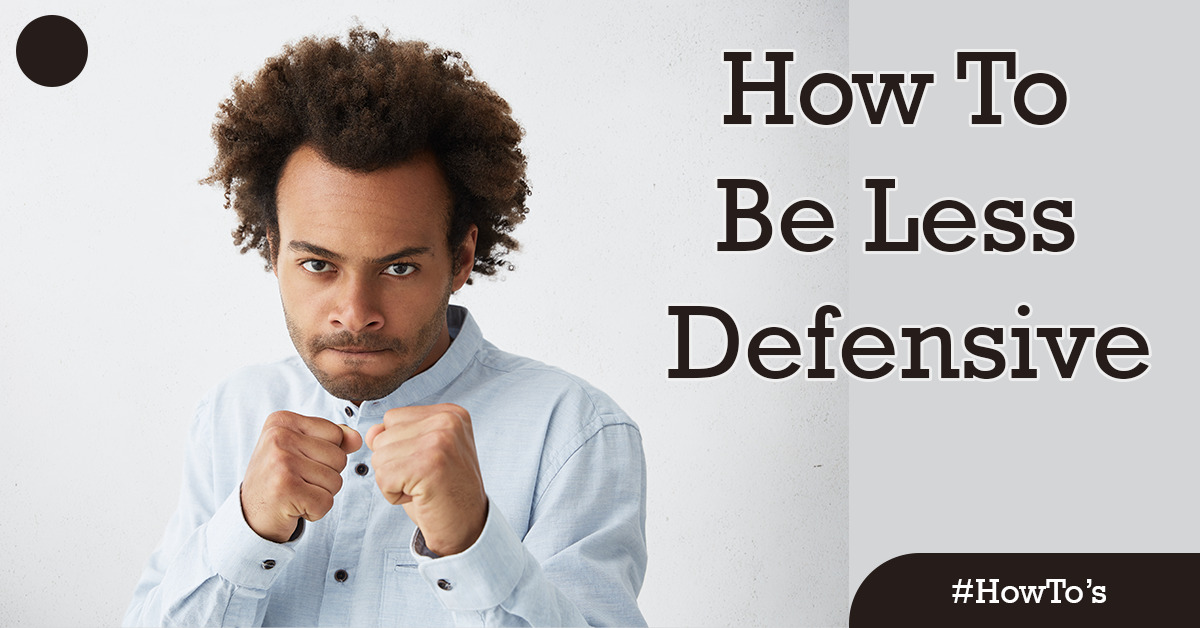
How To Be Less Defensive: The need to defend oneself might surface at any time, in any setting. You can snap at a coworker for criticizing your job, or you might defend a comment you made in haste to your significant other. Becoming less defensive is a useful skill to have regardless of the circumstances. Simply said, it is not a pleasant experience. EnoughInfo.com

Stop thinking about how tough it is to be on the receiving end of such fervent defensiveness. Being the target of such harsh criticism or hurtful words is a terrible position to be in. That’s because behind most witty rejoinders and cold looks is a well of emotional agony.
FAQs & Answers on How To Be Less Defensive
1. How can I become less defensive?
One way to become less defensive is to practice active listening. This involves truly listening to what someone is saying without interrupting or formulating a response. Additionally, try to view feedback as an opportunity for growth rather than a personal attack. Finally, it may be helpful to reflect on the underlying emotions that drive defensiveness, such as fear or insecurity, and work on addressing those.
2. How can I learn to take responsibility for my actions?
Taking responsibility for your actions involves acknowledging your mistakes and their impact on others, expressing genuine remorse, and taking steps to make amends. It may also involve reflecting on the underlying motivations or beliefs that led to the behavior and making changes in those areas.
3. How can I communicate more effectively in conflict situations?
Effective communication in conflict situations involves actively listening to the other person’s perspective, expressing your own feelings and needs clearly and respectfully, and working collaboratively to find a mutually beneficial solution. It may also be helpful to focus on the present issue rather than bringing up past conflicts or personal attacks. How To Maintain Interpersonal Relationships(Tips)
4. How can I build trust in relationships?
Building trust in relationships involves being honest and transparent, keeping your promises, respecting boundaries, and actively working to understand and empathize with the other person’s perspective. It may also involve acknowledging mistakes and taking responsibility for them, as well as showing vulnerability and openness.
5. How can I work on my own emotional regulation?
Working on emotional regulation involves developing awareness of your own emotions and triggers, identifying healthy coping strategies for managing difficult emotions, and practicing self-care and stress management. It may also involve seeking support from a therapist or counselor to work through past traumas or emotional blocks.
How To Be Less Defensive
Have you been trying to figure out how to be less defensive? You may learn to feel less defensive and act less defensively by employing a variety of methods and coping mechanisms. In order to help you become less defensive, I have included some suggestions below. How To Be Less Uptight(The Ultimate Guide)
Realize How Defensive You Really Are
Recognizing the occurrence of protective behavior is the first step in eliminating it. It’s easy to avoid looking at one’s own actions and recognizing when one is acting defensively. Instead, focus on being mindful of your emotions and actions in the now. You can also keep a diary in which you record your thoughts and feelings at the end of each day and analyze how you responded to certain events. How To Be Less Defensive(The Ultimate Guide)
Emotions Are Valid, So Recognize Them
After being aware of your defensive tendencies, it is crucial to validate your emotions whenever you are criticized. Acknowledging that you are wounded, frightened, humiliated, afraid, or insecure can be a powerful step toward resolving the conflict. Do your best not to add to the situation by beating yourself up for experiencing these sentiments. Accepting the emotions will help you avoid fixating on them.
Do not react based on your emotions
You don’t have to act on the temptation to respond defensively if you accept that you’re feeling wounded or guilty and show compassion for yourself for how you’re feeling. Whilst it’s understandable that you’d be on the defensive, it doesn’t mean you have to take any drastic measures. Instead, you may be kind to yourself and acknowledge that it’s normal to feel this way sometimes. How to gain control of Your Emotions
Make the decision to live in accordance with your core beliefs
What kind of person do you want to be? Does acting defensively fit that vision? If not, then you need to figure out how you plan to act. When you find yourself getting defensive, try picturing how your most confident self would respond. Rather than acting on your protective emotions, jot down some alternatives and keep them in a diary for use when you need them. How To Ice Skate( The You Need To Know)
Included below are some suggestions on what you can do to avoid resorting to defensive behavior in the future.
- Express your feelings and explain why you were upset by the other person’s statements.
- Act confidently and demand respect from the other person no matter how harsh their critique may be.
- Keep the conversation focused on finding a solution to the issue at hand.
Identify impending moments of defensiveness and prepare accordingly
When are you most prone to get defensive, and do you know why? Maybe it’s when you’re with that one person or in that one setting. The greatest thing you can do is to think about the scenarios in which you are most likely to feel defensive and write them down.
If you’ve been taken off guard or astonished, you may respond defensively. Knowing when this is more likely to occur will allow you to better prepare yourself emotionally and mentally.
Boost Your Self Esteem
Doing activities that make you feel more confident or increase your self-esteem might be useful if you tend to get defensive about certain topics or aspects of your life.
If for whatever reason, you feel embarrassed when the subject of your physical health is brought up in conversation, you could benefit from reminding yourself that you are doing all the necessary steps to ensure that you are the healthiest version of yourself. Binance Auto Investment: How it Works and Why You Should Use It
Consult a Therapist
You may want to consider therapy or counseling to help you overcome defensiveness if you find yourself unable to do so on your own. If your partner is becoming defensive, this may be of great assistance.
You two could benefit from attending couples counseling if you want to improve your ability to communicate with one another. How To Develop Good Communication Skills
Accept Accountability
As an alternative to instantly reacting to your hurt or criticized sentiments, you may attempt to accept responsibility for whatever role you may have played in the conflict. Saying “You’re right, I should have done that” is an example of admitting that you were wrong not to accomplish something that was requested of you. Please accept my sincere apologies.
When you admit that you’re at least partly to blame, the other person will likely relax and you’ll be able to work together to find a solution.
Improve Your Communication Skills
Developing better communication skills is another strategy for overcoming defensiveness. If you know that talking about a certain subject will constantly make you feel hurt or angry, it’s okay to inform the other person that you don’t want to bring it up unless you’re trying to work out a solution.
Communication breaks down when people keep going over the same old issues just to argue. Try practicing your communication skills in low-stakes circumstances or by visualizing your ideal approach to a certain issue before it actually arises. How to Improve Your Spoken English (25 Sure Tips)
Just for a moment, try to picture yourself discussing an issue without being defensive.
Conclusion
While defensiveness is a taught trait, it is also reversible. A need for professional assistance is warranted if, despite your best efforts, you are unable to eliminate your defensive behavior. Talking to a specialist in the field of mental health is something you should not be shy about. It might make all the difference in terms of your ability to communicate effectively and control your protective responses.
You are not alone in experiencing these emotions, and your responses are typical. There’s nothing improper about trying to modify your responses if they don’t reflect the kind of person you aspire to be or the kind of conduct you hope to exhibit. This decision will be beneficial for you and those around you.
Recommended;
How to gain control of Your Emotions
How to Handle a Bully in School
How To Be Less Uptight(The Ultimate Guide)
How To Improve Social Relationships( All You Need To Know)




